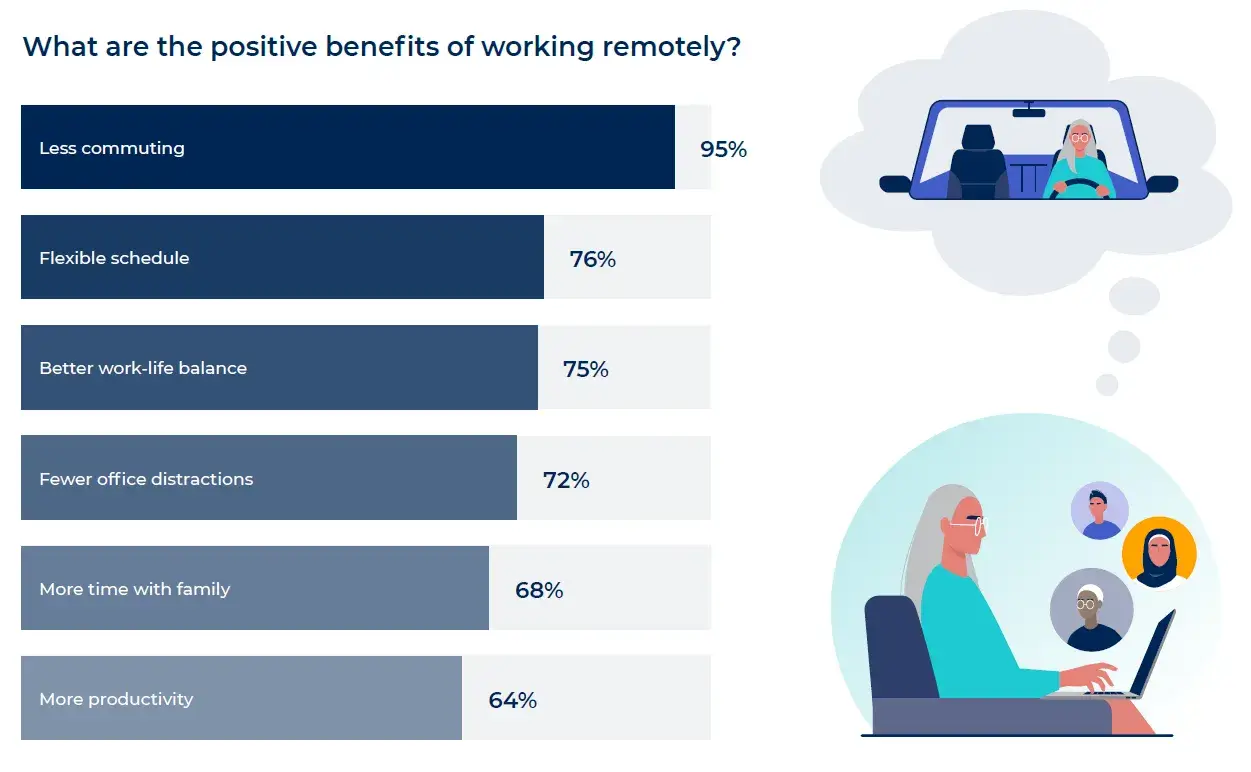We recently released our 2020 Hiring Benchmark Report based on a survey of over 400 hiring professionals from a wide range of industries. Unsurprisingly, one of the biggest shifts that organizations have had to face this year is the transition to remote work as a result of COVID-19.
In a previous blog post, we revealed that remote work has left quite a strong positive impression on those who have had the opportunity to try it for themselves. We asked respondents how their opinion of remote work has changed since the start of the COVID-19 pandemic, and 54% said they now view remote work more positively. Just 4% said they now view remote work more negatively, while 42% say that their opinion has not changed.
Overall, remote work has gained broader acceptance as a legitimate way to operate a successful company. But we also wanted to dig deeper into the reasons why people have taken a shine to remote work. In our survey, we asked hiring professionals what the positive benefits of working remotely are, and here’s what we found:

Right off the bat, we see that 95% of respondents say that less commuting is a major benefit of working remotely. This nearly unanimous verdict makes it clear that people are grateful to reclaim the lost time they used to spend in their daily commute.
According to data from the U.S. Census Bureau, the average American commute is 26.9 minutes, a number that has been steadily increasing each year. And according to the Washington Post, this adds up to about 225 hours per year (or over 9 full calendar days) that each American is spending in their commute each year.
But that isn’t the only benefit that people were experiencing. 76% appreciate the flexible schedule that remote work enables. Data from FlexJobs has shown that flexible work is linked to retention, with 80% of workers saying they would feel more loyal to their employer if the company offered flexible work options. That same report found that nearly a third of workers have looked for a new job because their current employer doesn’t offer flexible work options, while 52% have tried to negotiate a flexible arrangement with their employer at some point.
Further down the chart, we see that 75% of respondents appreciate the work-life balance that remote work affords. A lot of this likely stems from cutting the commute out of the equation. From a survey conducted by Ceridian, 66% of job candidates said that work-life was an important consideration when accepting a job offer.
Next, we see that 72% appreciate having fewer office distractions at home, and 68% appreciate having more time with family.
Finally, 64% feel that they can be more productive at home than they can at the office. While the majority of respondents seem to feel more productive at home, it’s the least strongly purported benefit in the bunch. This suggests that better productivity isn’t necessarily a given at home. After all, the home comes with distractions of its own. Whether it’s distractions from other people – your spouse, children, roommates (or even pets); or distractions from the internet, the TV, and daily chores; workers have to find new ways to be productive in a remote environment.
Remote work has left a positive impression on those who have tried it. But will it continue to be the norm after COVID-19 fades away? With stay-at-home orders likely to last well into 2021, the future still remains uncertain. One thing that seems pretty clear is that workers like the flexibility that remote work affords, and the benefits that go along with it. In the future, organizations that offer remote work options will likely have a competitive advantage when attracting top talent. For this reason, we expect that many organizations that can offer some degree of remote work flexibility will likely continue to do so even after COVID-19 is behind us.
Want to see more data on how COVID-19 has changed hiring in 2020? Download the 2020 Hiring Benchmark Report.





